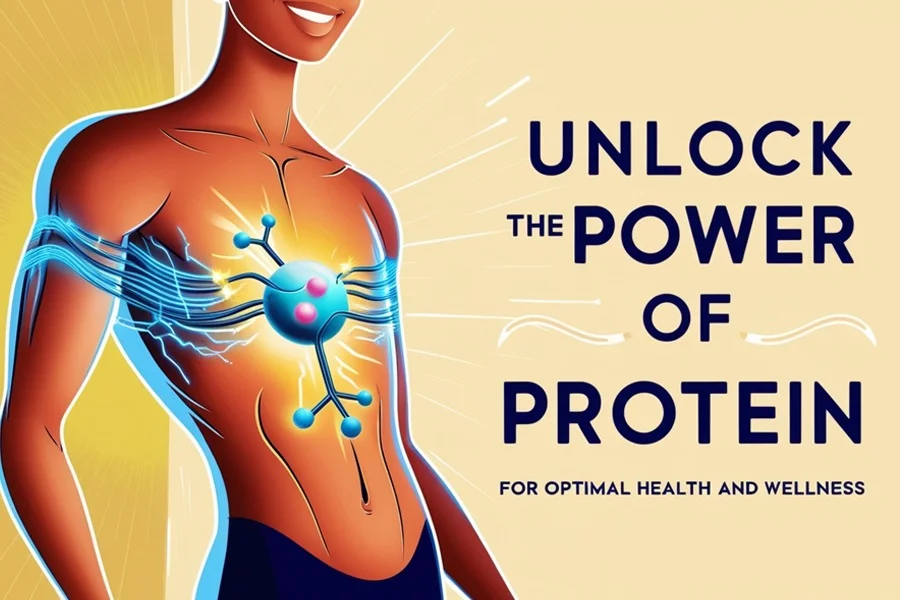Protein is the cornerstone of human nutrition, playing a critical role in growth, repair, and overall health. Whether you’re an athlete striving for peak performance or someone looking to maintain a healthy lifestyle, understanding protein’s function is essential. By unlocking the power of protein, you can support muscle development, immune function, and energy regulation while promoting long-term wellness.
This guide explores the importance of protein, its dietary sources, how much you need, and strategies to maximize its benefits.
What is Protein? Understanding the Basics
Protein is a macronutrient composed of building blocks called amino acids. These amino acids are classified into two groups:
- Essential Amino Acids: The body cannot synthesize and must come from the diet.
- Non-Essential Amino Acids: Produced by the body as needed.
Proteins serve as the structural framework for muscles, skin, and organs. They also act as enzymes, hormones, and antibodies, facilitating countless bodily functions.
The Health Benefits of Protein
Muscle Growth and Repair
Protein provides amino acids that repair damaged tissues and build muscle mass. This is especially important for individuals who are strength training or recovering from injuries.
Weight Management
High-protein diets can aid in weight loss by increasing satiety and reducing hunger hormones like ghrelin. This helps regulate calorie intake without the discomfort of persistent hunger.
Enhanced Metabolism
Digesting protein requires more energy than fats or carbohydrates, boosting your metabolic rate.
Stronger Immune System
Proteins are the foundation of antibodies and immune cells, crucial for defending against illnesses and infections.
Hormonal Balance
Protein supports hormone production, including insulin and thyroid hormones, which regulate blood sugar and metabolism.
Daily Protein Requirements: How Much is Enough?
The recommended dietary allowance (RDA) for protein varies based on age, gender, activity level, and health status:
- Sedentary Adults: 0.8 grams per kilogram of body weight per day.
- Active Individuals: 1.2–2.0 grams per kilogram, depending on intensity.
- Older Adults: Slightly higher intake to counteract muscle loss.
How to Calculate Your Protein Needs
For an individual weighing 70 kg:
- Sedentary Needs: 70 × 0.8 = 56 grams/day.
- Active Needs: 70 × 1.5 = 105 grams/day.
Top Sources of Protein
To fully unlock the power of protein, include diverse sources in your diet:
Animal-Based Proteins
- Eggs: Complete protein packed with all nine essential amino acids.
- Lean Meats: Chicken, turkey, and lean beef provide high-quality protein with minimal fat.
- Fish: Salmon, tuna, and sardines are rich in protein and omega-3 fatty acids.
- Dairy: Milk, yogurt, and cheese offer protein, calcium, and vitamin D.
Plant-Based Proteins
- Legumes: Lentils, chickpeas, and black beans are excellent for protein and fiber.
- Tofu and Tempeh: Soy-based options ideal for vegetarians and vegans.
- Quinoa: A unique grain with a complete amino acid profile.
- Nuts and Seeds: Almonds, sunflower, and chia seeds provide protein and healthy fats.
Explore this blog to sustainable nutrition for a deeper dive into plant-based protein options.
Maximizing Protein Utilization
Distribute Protein Intake
Spreading protein across meals optimizes absorption and muscle protein synthesis. Aim for 20–30 grams of protein per meal.
Combine Protein Sources
Pairing complementary proteins (e.g., rice and beans) ensures you receive all essential amino acids, especially in vegetarian diets.
Post-Workout Recovery
Consuming protein within 30 minutes of exercise accelerates muscle repair and replenishment. Popular post-workout options include protein shakes or Greek yogurt with fruit.
Protein Timing for Sleep
A casein-rich snack like cottage cheese before bed slowly releases amino acids, aiding overnight muscle repair.
Common Myths about Protein
High-Protein Diets Damage Kidneys
While individuals with pre-existing kidney issues should monitor protein intake, there’s no evidence linking high-protein diets to kidney damage in healthy individuals.
You Can’t Eat Too Much Protein
Excessive protein can lead to weight gain and strain the kidneys, as excess amino acids are converted to fat or excreted.
Plant Proteins Are Inferior
When combined strategically, plant proteins can be as effective as animal proteins in meeting dietary needs.
The Risks of Protein Deficiency
A lack of adequate protein can result in:
- Muscle Wasting: Reduced muscle mass and strength.
- Weakened Immunity: Increased susceptibility to infections.
- Slow Wound Healing: Insufficient protein hampers tissue repair.
- Edema: Low protein levels disrupt fluid balance, leading to swelling.
Ensure your diet meets your protein needs to avoid these risks.
How to Incorporate Protein into Your Diet
Breakfast
- Scrambled eggs with spinach and whole-grain toast.
- Greek yogurt with granola and berries.
Lunch
- Grilled chicken salad with quinoa and mixed vegetables.
- Lentil soup with a side of whole-grain bread.
Dinner
- Baked salmon with roasted asparagus and sweet potatoes.
- Stir-fried tofu with brown rice and broccoli.
Snacks
- Almonds, cheese sticks, or protein bars for on-the-go nourishment.
Also Read This : Benefits of Protein in Your Diet: How to Choose the Best Sources
Protein and Sustainability
Consuming protein sustainably is vital for the planet’s health. Opt for eco-friendly options like plant-based proteins, local meats, and sustainably sourced seafood. For practical tips on sustainable eating, check out this sustainability-focused article.
Conclusion: Embrace Protein for a Healthier Life
Unlocking the power of protein is a transformative step toward optimal health and wellness. Protein is integral to a thriving body from muscle repair to immune support. You can achieve your fitness and wellness goals by incorporating various high-quality protein sources and balancing your intake while enjoying a delicious and nutritious diet.
Protein is more than just a nutrient—it’s a lifestyle choice that empowers you to live your best life. Make protein the foundation of your diet, and experience its remarkable benefits.
Disclaimer: This power of protein article provides general information and the images are used for reference only. It is not a substitute for professional medical advice, diagnosis, or treatment. Always consult with a specialist or your own doctor for more information. Well Health Organic does not take responsibility for the accuracy or completeness of this information. We do not guarantee the products, remedies, or information mentioned here, nor do we guarantee any products or information accessed through links provided. We do not recommend purchasing these products.



















